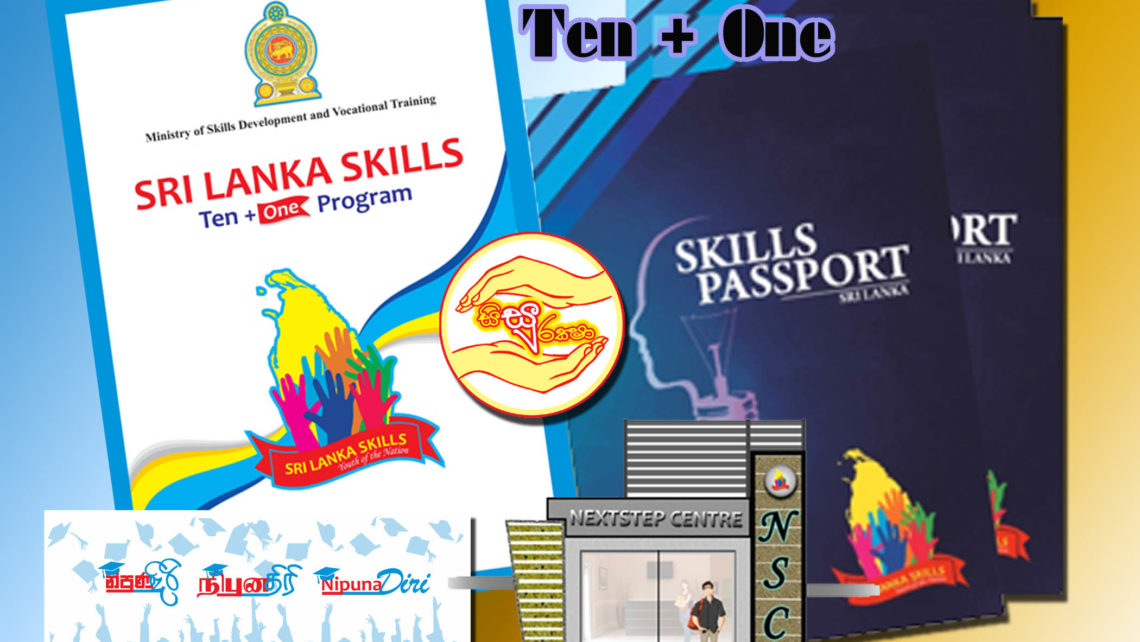Context: Over the last few years, the Sri Lankan Government has taken steps to improve the school-to-work transitions of youth, such as funding career counselling programmes organized by national youth organizations. However, the development and impact of these programmes have been hampered by bureaucracy. To overcome this bureaucracy and make youth programmes sustainable, the Ministry of Skills Development and Vocational Training (MSDVT) created the Sri Lanka Skills: Ten+One programme.
Implementation: Sri Lanka Skills: Ten+One streamlines the implementation of youth employment promotion programmes by consolidating these initiatives into a ten-step plan. All the components of Sri Lanka’s various youth initiatives, such as access to career guidance and job market information, skills and knowledge development as well as financial support, are embodied in the plan.
1. Big Step: Subsidizes vocational training for an estimated 127,000 Sri Lankans that have not passed the General Certificate Education Ordinary Level exam and/or completed job training. Partners include the Ceylon German Technical Training Institute and the Automobile Engineering Training Institute in Orugodawatte.
2. “Nipunadiri” Scholarships: A scholarship system that helps students experiencing financial hardship to continue their university or vocational studies. MSDVT is planning a media campaign to increase public awareness of the scholarships.
3. “Sisuraksha” Insurance for Trainees: An insurance system that covers the medical costs of vocational students injured during training.
4. Loans for NVQ Certificate Holders: Provides low-interest loans to NVQ graduates starting or developing a small business. Traditionally, banks require proof of income and a witness for non-degree holders to obtain a business loan.
5. “Next Step” Career Guidance Centers: Establishes career guidance centres in 1,000 schools, with the intention of opening more centres in the future.
6. Skills Student Clubs in Each School: Establishes Skills Student Clubs through Literary and Mass Media Associations, which are already present in every school. “Next Step” centres are to supervise club activities. This initiative is to also establish Skills Community Clubs, under the guidance of local religious officials or other community leaders. Skills Community Clubs are to identify regional job market trends and direct students to related training.
7. “Nipuna Thahavuru”: Awards credit towards earning an NVQ for professional experience acquired in specific trades, such as law enforcement. By rewarding “on-the-job” training, the initiative encourages labourers to develop qualifications that enhance their skill set, such as expertise in information technology (IT).
8. Multi Expert Programme: Provides vocational training for three-wheeler (motor taxi) drivers. Initially, only carpentry, masonry, plumbing and electrician training are to be made available, and three-wheeler associations are to coordinate with police and vocational institutes to enrol participants.
9. Skills App (SApp): A skills app that facilitates distance learning for certification of beauticians, preschool teachers, caregivers and nursing assistants. Participants receive additional certificates from the British Council and Microsoft Institute for completing compulsory courses in English and IT, respectively. Sri Lanka Telecom is to partner with MSDVT to implement SApp.
10. Skills Passport: An online database that allows employers worldwide to view the qualifications and achievements of labourers, such as language proficiency, NVQ level, and professional experience. Skills Passports function essentially as online curriculum vitaes and a promotional tool for vocational workers seeking jobs outside their communities or abroad.
Main Challenges: In Sri Lanka, the education that students receive does not reflect current trends in the job market, and it is oriented to reward the few students that complete their higher education in preparation for white collar positions. Despite the disadvantages that youth without higher education or sufficient training face in the job market, MSDVT developed the Ten+One and other youth employment promotion programmes largely without input from this cross section of youth. MSDVT and Government departments have also failed to consult self-employed and minority youth about the effectiveness of Ten+One in addressing the specific challenges they face in the job market, such as deficient Sinhalese and English language skills.
Results: Youth’s qualitative, effective and operative skills have fulfilled the sustainable national development objectives of Sri Lanka. Prioritizing the contribution of job seeking youth to make decisions on development objectives and programmes and to implement them has been vital.
Moving Forward: Orienting programmes to facilitate the school-to-work transitions of youth should be the principal focus of Ten+One. A limited percentage of Sri Lankan youth receive career guidance from sources other than parents and relatives, so MSDVT should work quickly to introduce and expand career guidance centres in schools. Moreover, centres should encourage and guide students in establishing short- and long-term goals for their professional development. MSDVT should also prioritize English and IT training components of Ten+One programmes as well as the Skills Passport, so that vocational workers can more effectively pursue higher wage positions abroad.
Replicability: A core aspect that has contributed to the success of the initiative is that Ten+One addresses a wide range of issues hampering youth employment, and improves the links between various public and private institutions to streamline implementation and expedite results. Success also depends on maximizing the impact of initiatives by providing support to youth with different educational qualifications and backgrounds, particularly young women. Periodically reviewing the entry requirements for vocational training, types of vocations offered, and methods of instruction can ensure that all youth benefit.
References:
Sri Lanka Skills. 2017. “Ten+One Programme.” Ministry of Skills Development and
Vocational Training. Accessed 12 December 2017.
Acknowledgements:
This good practice was kindly edited by Ms. Elizabeth Linklater
Project Details
Date: June 11, 2018
